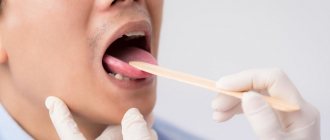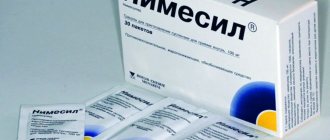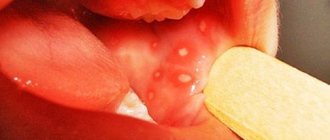Necrotizing ulcerative stomatitis is a dental disease in which the oral mucosa becomes inflamed. This problem can be called differently, for example, ulcerative gingivitis, ulcerative stomatitis, ulcerative-necrotic stomatitis of Venson (Vincent), etc. The disease, as a rule, develops dynamically in children under 3 years of age, but is often diagnosed in adults. The disease is not a death sentence; with proper and comprehensive treatment, it is possible to relieve acute symptoms and consolidate the results, excluding relapses.
The main causes of ulcerative necrotic stomatitis
The main causative agents of the disease are pathological bacteria (in particular, Vincent's spirochete), which actively develop in the oral cavity, especially in the space between the dental units. They are present in the cavity of an absolutely healthy person, but when exposed to certain factors, they actively multiply and provoke a pathological process.
Prerequisites for the development of the disease:
- advanced stages of catarrhal gingivitis;
- abundant carious lesions of teeth;
- tartar;
- weak immunity;
- insufficient oral hygiene;
- lack of cavity sanitation;
- viral diseases;
- mechanical injuries to gums and teeth;
- suffered stress, depressive states;
- taking strong medications.
Causes and types of stomatitis
Treatment of stomatitis in young children is carried out by treating the affected areas with special medicinal compounds, the choice of which is carried out in accordance with the etiology of the disease. Treatment is prescribed by the pediatric dentist after examining the small patient and identifying the cause and nature of the disease.
The disease can develop due to bacteria entering the mouth through dirty hands or cutlery, as well as due to a weakened immune system. The spread of pathogenic bacteria in a child’s body occurs at extreme speed due to the vulnerable mucous membrane. An additional factor is weak salivation, which causes a lack of hydration. Excessive dryness leads to cracks into which bacteria penetrate and cause disease.
Stomatitis often develops while taking pharmacological drugs. To avoid progression of the disease, you need to stop taking antibiotics. During the consultation, the decisive factor is the observations of the parents. They are the ones who can explain the cause of the disease (injury to the mucous membrane, allergies, taking antibiotics).
The main symptoms of Vincent's stomatitis
The most common symptom is the presence of numerous ulcerations in the oral cavity: on the inside of the cheeks, lips, palate and other areas. Other manifestations may vary, depending on the degree of the disease.
Symptoms of mild ulcerative stomatitis:
- increased salivation;
- pain in the mouth, especially when palpating soft tissues;
- bleeding gums, especially when eating and brushing teeth;
- swelling of the gums.
Manifestations of ulcerative necrotic stomatitis of the middle stage.
- wounds with necrotic crusts;
- bleeding gums;
- unpleasant odor;
- pus secreted from periodontal pockets;
- enlarged and painful lymph nodes;
- muscle weakness and loss of strength;
- temperature increase;
- loss of appetite.
Symptoms of ulcerative stomatitis of complex stage.
- severe weakness;
- stomach ache;
- nausea;
- vomit;
- increased body temperature;
- deep ulcers that can reach the bone tissue.
If these symptoms appear, you must immediately consult a dentist! The disease is treated exclusively under the supervision of an experienced doctor - treatment at home can significantly aggravate the situation.
Using medications to treat canker sores
Find out which common medications prescribed to get rid of canker sores are best to stay away from.
Side effects of common medications
Here are a few medications often recommended for this condition. However, be careful as there are potential health risks associated with taking them.
1. Mouthwashes containing the corticosteroid dexamethasone. Corticosteroids cause a variety of side effects, and dexamethasone is no exception. The list of negative consequences of taking it includes:
- vision problems;
- swelling;
- weight gain;
- sleep problems such as insomnia;
- changes in mood;
- acne;
- dry and thin skin;
- bruising and skin discoloration;
- headache;
- dizziness;
- nausea;
- stomach ache.
2. Topical over-the-counter and prescription medications such as pastes, creams, gels, or liquids whose active ingredients are benzocaine (a local anesthetic) and fluocinonide (another steroid). Read the list of possible side effects that may occur as a result of their use.
Benzocaine:
- allergic reactions such as burning, itching, peeling and the appearance of dry white scales on the surface of the skin;
- breathing problems;
- dizziness;
- fast heartbeat;
- headache;
- restlessness, nervousness or anxiety;
- weakness.
Fluocinonide:
- dry or cracked skin;
- itching and burning;
- changes in skin color;
- headache;
- severe rashes or redness, weeping and swollen skin;
- excessive hair growth;
- nausea or vomiting;
- inflamed hair follicles;
- hoarse voice.
These medications may also contain an ingredient called hydrogen peroxide. It is a well-known antiseptic that is effective against bacteria. Hydrogen peroxide destroys the membranes of bacterial cells by attaching their electrons. The enzyme attracts catalase located inside the bacteria, after which a reaction occurs between them, accompanied by hissing and the release of an oxygen molecule. However, the main problem with hydrogen peroxide is that it does not distinguish between healthy cells and pathogenic bacteria in a wound. This means that it can also take electrons from the membranes of healthy cells, destroying them and reacting with catalase.
Using too much hydrogen peroxide can cause excessive oxidative damage to cells, slow wound healing, and increase the risk of scarring. This substance is appropriate to use only if you need a powerful and effective antiseptic.
3. Oral medications. They are usually prescribed for severe ulcers that do not respond to current treatments. These drugs taken orally often cause enormous harm to the body, if only because they are not intended for such use at all. Two examples:
- Sucralfate, also called Carafate, is developed to treat intestinal ulcers. Typically used for gout, but may cause nausea, vomiting, stomach pain, headaches, or dizziness.
- Oral steroids prescribed for severe aphthous ulcers that have failed other treatments are considered a last resort due to the risk of severe side effects.
4. Cauterization of sores. This is a procedure in which an instrument or chemical is used to burn, scorch or destroy affected tissue. Cauterization is often recommended because chemical removal of the ulcer reduces the time it takes for it to completely heal to about a week. Debacterol is usually used during this procedure. This substance helps treat ulcers and other gum diseases. In some cases, silver nitrate is used for cauterization, but it only relieves severe pain and does not speed up the healing process. Silver nitrate is highly toxic and dangerous if swallowed.
Natural Ways to Relieve Canker Sore Pain
If the pain of canker sores is too much to bear, here are some of the most commonly used natural remedies:
- regular mouth rinse. Rinse the ulcers with salt water or baking soda solution, mixing 1 tsp. soda with half a glass of warm water;
- Magnesium hydroxide. Apply a small amount to the affected area several times a day;
- ice. Applying ice to ulcers helps relieve pain quickly;
- Coconut oil. It has anti-inflammatory and antimicrobial properties. Using a cotton swab or clean hands, apply a small amount to affected areas two or three times daily;
- honey. Raw organic honey is renowned for its potential antibacterial and anti-inflammatory properties. A 2021 study found that it reduced symptoms of one of the complications of chemotherapy and radiation therapy, induced oral mucositis.
- Apple vinegar. Combine equal parts apple cider vinegar and warm water. Rinse your mouth with this mixture and then spit it out.
You can also try alternative or naturopathic treatments for canker sores, but you should consult your dentist first. Here are some of the potentially effective naturopathic remedies:
- Rhodiola rosea;
- smooth licorice;
- mahonia holly root;
- spilanthes flowers;
- common cuff leaves;
- myrtle leaves.
Because ulcers can develop due to a deficiency of nutrients such as zinc, vitamins B6 and B12, folic acid, or folate, your doctor may recommend taking supplements to boost your levels.
Moscow metro station Zvezdnaya, Danube Avenue, 23
How to treat ulcerative stomatitis?
Effective treatment of Vincent's ulcerative stomatitis should be comprehensive:
- Anesthesia – performed to relieve acute pain. Experts recommend applying compresses with pain-relieving solutions.
- Removing rashes. This should only be done by a doctor. First, compresses with a softening composition are applied to the ulcers, after which the crusts are gradually cleared from the surface of the mucosa, treating with hydrogen peroxide, potassium permanganate, chlorhexidine, etc.
- General treatment. It involves taking antihistamines that relieve general tissue irritation and the inflammatory process. For severe manifestations and complex symptoms, antibiotic therapy is prescribed. It is also recommended to take a course of vitamin therapy.
- Sanitation of the oral cavity. Effective treatment of caries, removal of pathological teeth. For wound healing, treatment with keratoplasty preparations, gels and ointments is recommended.
It is important! The disease cannot be treated at home! The maximum you can do on your own is to rinse your mouth with a decoction of chamomile or calendula, but strictly after professional dental care.
Candidal stomatitis
Candidal stomatitis is known as thrush. It can appear in children even in infancy, and it is caused by saprophytic fungi, which become pathogenic when immunity decreases. With this type of stomatitis, white spots appear in the child’s mouth. In addition, there may be an occasional increase in temperature and the appearance of photophobia. Infection of a child can occur through contaminated dishes, toys or pacifiers.
Treatment of candidal stomatitis involves undergoing daily procedures in the dental office, rinsing the mouth with alkaline solutions, and taking vitamins.
Treatment of stomatitis in a child cannot be delayed, otherwise this may lead to relapse of the disease. CELT pediatric dentists recommend regular preventive examinations that will help prevent the development of serious dental diseases, including stomatitis!
How to treat ulcerative stomatitis with diet?
Diet alone will not be enough to completely cure the disease, but it is mandatory to speed up the recovery process. With such a diagnosis, it is very important to devote time to proper nutrition.
For stomatitis, the following products are recommended: vegetables, fruits, viscous porridges, greens, milk and dairy products, cheese, soups, herbal infusions, green tea, steamed meat without salt, low-fat fish, natural vegetable juices.
Patients with this disease are not recommended to eat: sour fruits and vegetables, citrus fruits, pickled and peppered foods. Also not recommended are foods that provoke allergies, too sweet foods, dry foods and those foods that can cause mechanical damage to the mucous membrane (nuts, crackers, dried fruits, etc.).
How to care for a child after stomatitis appears?
Without the help of parents, a child will never get rid of the disease, because strict discipline is needed. You must follow all the requirements of the pediatric dentist and pay special attention to diet and pain medications.
Prefer soft food with a temperature of no more than 28o C. It is important that it has a balanced composition of carbohydrates, fats, proteins, vitamins, and minerals. Allergens, as well as spicy, sweet, sour and very salty foods, must be excluded from the diet. It is advisable to exclude citrus fruits due to their high acid content. After eating, rinse your mouth with filtered or boiled water.
Treatment includes the use of painkillers. The child will feel severe pain at first, which will interfere with sleep. Therefore, you need to regularly rinse your mouth not only with clean water, but also with medicinal balms. The affected area should be smeared with medicinal gel. All recommendations for treatment and pain relief will be given to you by your pediatric dentist during your consultation.
Make an appointment through the application or by calling +7 +7 We work every day:
- Monday—Friday: 8.00—20.00
- Saturday: 8.00–18.00
- Sunday is a day off
The nearest metro and MCC stations to the clinic:
- Highway of Enthusiasts or Perovo
- Partisan
- Enthusiast Highway
Driving directions










